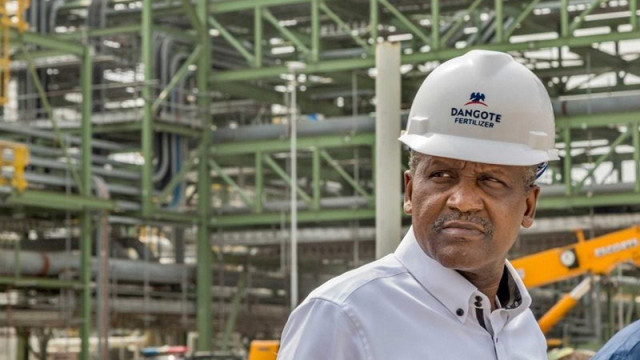The Federal Government's committee tasked with implementing crude oil sales to local refineries in Naira will further discuss the pricing of Premium Motor Spirit, commonly known as petrol, to be released by the Dangote Petroleum Refinery next month.
Oil marketers and members of the Implementation Committee on crude oil sales in Naira have confirmed that the panel will hold a series of meetings to conclude a framework that sets a benchmark for the amount the Dangote Refinery will pay for crude in Naira.
The Federal Government will have to decide whether to subsidise the petrol from the plant or allow Nigerians to buy the product at the market price.
Oil marketers have claimed that the cost of Dangote petrol will be higher than the current pump prices, and it will be challenging for dealers to buy the commodity from the plant if the Federal Government fails to intervene in the price.
Petrol is sold at a range of N600 to N700 per litre across different regions in the country.
According to data from the Major Energies Marketers Association of Nigeria, the landing cost of the product is N1,117 per litre.
Marketers stated that that was the actual market price and that the cost from the Dangote refinery should be around that figure.
The Nigerian National Petroleum Company Limited is the sole importer of petrol into the country, as other marketers have stopped importing due to their inability to access the required US dollars.
But last week at the presentation of the audited report and accounts of NNPC for the 2023 business year in Abuja, the firm’s Chief Financial Officer, Umar Ajiya, admitted that the oil firm was shouldering a heavy subsidy burden on petrol imports.
He said NNPC had been making PMS available for retail distribution at about half of the landing cost under an agreement with the government.
He explained that the company had been offsetting the shortfall in landing price and sale price through a reconciliation arrangement between the government and the company.
He said the company had not paid any money to any marketer in the name of petrol subsidy in the last eight to nine years.
While the official pump price of petrol is about N600/litre, the average landing cost is about N1,200/litre.
Ajiya said the company covered about N7.8tn in “shortfall” in the first seven months of this year.
He said, “I think there is one fact that I need to make very clear; in the last eight or nine years, this company, even as a corporation as it were, has not paid anybody a dime or one naira as subsidy.
“No one has been paid a kobo by the NNPC in the name of subsidy. No marketer has received money from us by way of subsidy.”
He said the government directed NNPCL to sell the petrol it imports at a price that is half of the landing price.
He said at times, the Federal Government paid the money and it could as well net off for it.
“What has been happening is that we have been importing PMS, landing at a certain price, and the government is telling us to sell it at half price. So, that gap between that landed price and the half price is what we call shortfall or we call it a subsidy,” the CFO explained.
He added, "The federal government has been requiring us to sell PMS at half the price we paid to import it, creating a shortfall or subsidy. The government has reached an agreement with Dangote Refinery to start selling crude oil to local refineries in Naira starting October 1, 2024.
"The government is considering either subsidising the cost of petrol from the Dangote refinery or allowing Nigerians to pay the market price, which will be high.
"The only way for the government to intervene is to subsidise, as NNPC cannot continue bearing the subsidy burden. The solution is for Nigerians to pay the real cost of petrol, but the government is aware of the impact on the economy."




















